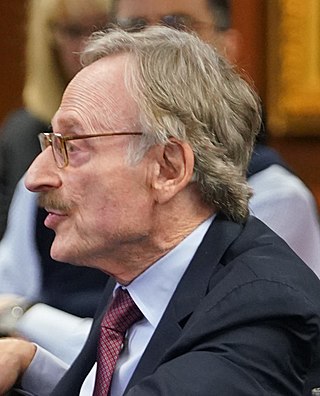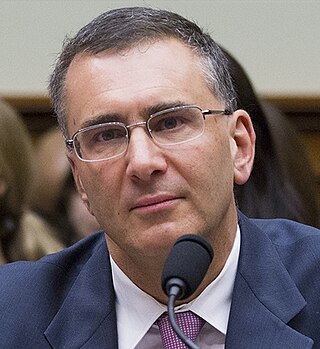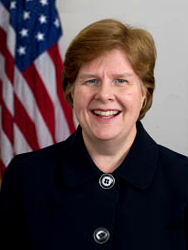Robert A. Johnson is the executive director of the Institute for New Economic Thinking and regularly contributes to NewDeal 2.0 with his "FinanceSeer Column." He also formerly traded currency on Wall Street under George Soros. [1] [2]
Johnson received a B.S. in electrical engineering and a B.S. in economics from the Massachusetts Institute of Technology. [3] Johnson received a Ph.D. and M.A. in economics from Princeton University. [3]
Between 1996 and 2006, Johnson founded Bottled Majic Music, a music company, that bought Rooster Blues. [4] [5]
Johnson claims that unemployment and underemployment (idle labour resources) have led to lower tax revenues, which have led to a budget deficit problem for the USA government under George W. Bush and Barack Obama. [6] He also cites the lack of a tax on richer Americans who have inherited wealth at birth or at a young age as another reason for this, in addition to the effects of government bailouts to large capitalist institutions in the years after 2008.
Johnson is married to Alexis McGill Johnson, who is the president of Planned Parenthood.

William Spencer Vickrey was a Canadian-American professor of economics and Nobel Laureate. He was a lifelong faculty member at Columbia University. A theorist who worked on public economics and mechanism design, Vickrey primarily discussed public policy problems. He originated the Vickrey auction, introduced the concept of congestion pricing in networks, formalized arguments for marginal cost pricing, and contributed to optimal income taxation. James Tobin described him as "an applied economist’s theorist, as well as a theorist’s applied economist.”

Deregulation is the process of removing or reducing state regulations, typically in the economic sphere. It is the repeal of governmental regulation of the economy. It became common in advanced industrial economies in the 1970s and 1980s, as a result of new trends in economic thinking about the inefficiencies of government regulation, and the risk that regulatory agencies would be controlled by the regulated industry to its benefit, and thereby hurt consumers and the wider economy. Economic regulations were promoted during the Gilded Age, in which progressive reforms were claimed as necessary to limit externalities like corporate abuse, unsafe child labor, monopolization, and pollution, and to mitigate boom and bust cycles. Around the late 1970s, such reforms were deemed burdensome on economic growth and many politicians espousing neoliberalism started promoting deregulation.
Supply-side economics is a macroeconomic theory postulating that economic growth can be most effectively fostered by lowering taxes, decreasing regulation, and allowing free trade. According to supply-side economics theory, consumers will benefit from greater supply of goods and services at lower prices, and employment will increase. Supply-side fiscal policies are designed to increase aggregate supply, as opposed to aggregate demand, thereby expanding output and employment while lowering prices. Such policies are of several general varieties:

Arthur Betz Laffer is an American economist and author who first gained prominence during the Reagan administration as a member of Reagan's Economic Policy Advisory Board (1981–1989). Laffer is best known for the Laffer curve, an illustration of the theory that there exists some tax rate between 0% and 100% that will result in maximum tax revenue for government. In certain circumstances, this would allow governments to cut taxes, and simultaneously increase revenue and economic growth.
The Walter A. Haas School of Business is the business school of the University of California, Berkeley, a public research university in Berkeley, California. It was the first business school at a public university in the United States.

Trickle-down economics refers to economic policies that disproportionately favor the upper tier of the economic spectrum, comprising wealthy individuals and large corporations. The policies are based on the idea that spending by this group will "trickle down" to those less fortunate in the form of stronger economic growth. The term has been used broadly by critics of supply-side economics to refer to taxing and spending policies by governments that, intentionally or not, result in widening income inequality; it has also been used in critical references to neoliberalism.
Robert Joseph Barro is an American macroeconomist and the Paul M. Warburg Professor of Economics at Harvard University. Barro is considered one of the founders of new classical macroeconomics, along with Robert Lucas Jr. and Thomas J. Sargent. He is currently a senior fellow at Stanford University's Hoover Institution and co-editor of the influential Quarterly Journal of Economics.

Jonathan Adair Turner, Baron Turner of Ecchinswell is a British businessman and academic who was Chairman of the Financial Services Authority during the 2007–2008 financial crisis and the Great Recession, serving from September 2008 until its abolition in March 2013. He is a former chairman of the Pensions Commission and the Committee on Climate Change, as well as a former Director-General of the Confederation of British Industry. He has described himself in a BBC HARDtalk interview with Stephen Sackur as a 'technocrat'.
Trickle-up economics is an economic policy proposition that final demand among a broad population can stimulate national income in an economy. The trickle-up effect states that policies that directly benefit lower income individuals will boost the income of society as a whole, and thus those benefits will "trickle up" throughout the population. It is the opposite of trickle-down economics.

Michael Jay Boskin is the T. M. Friedman Professor of Economics and senior fellow at Stanford University's Hoover Institution. He also is chief executive officer and president of Boskin & Co., an economic consulting company, and serves on the Commerce Department's Advisory Committee on the National Income and Product Accounts.
In American political theory, fiscal conservatism or economic conservatism is a political and economic philosophy regarding fiscal policy and fiscal responsibility with an ideological basis in capitalism, individualism, limited government, and laissez-faire economics. Fiscal conservatives advocate tax cuts, reduced government spending, free markets, deregulation, privatization, free trade, and minimal government debt. Fiscal conservatism follows the same philosophical outlook as classical liberalism. This concept is derived from economic liberalism.

Alan Bennett Krueger was an American economist who was the James Madison Professor of Political Economy at Princeton University and Research Associate at the National Bureau of Economic Research. He served as Assistant Secretary of the Treasury for Economic Policy, nominated by President Barack Obama, from May 2009 to October 2010, when he returned to Princeton. He was nominated in 2011 by Obama as chair of the White House Council of Economic Advisers, and served in that office from November 2011 to August 2013.

Jonathan Holmes Gruber is an American professor of economics at the Massachusetts Institute of Technology, where he has taught since 1992. He is also the director of the Health Care Program at the National Bureau of Economic Research, where he is a research associate. An associate editor of both the Journal of Public Economics and the Journal of Health Economics, Gruber has been heavily involved in crafting public health policy.

Jason Furman is an American economist and professor at Harvard University's John F. Kennedy School of Government and a nonresident senior fellow at the Peterson Institute for International Economics. On June 10, 2013, Furman was named by President Barack Obama as chair of the Council of Economic Advisers (CEA). Furman has also served as the deputy director of the U.S. National Economic Council, which followed his role as an advisor for the Barack Obama 2008 presidential campaign.
Thomas Ferguson is an American political scientist and author who writes on politics and economics, often within a historical perspective. He is best known for his Investment Theory of Party Competition, described in detail in his 1995 book Golden Rule: The Investment Theory of Party Competition and the Logic of Money-driven Political Systems.

Christina Duckworth Romer is the Class of 1957 Garff B. Wilson Professor of Economics at the University of California, Berkeley and a former chair of the Council of Economic Advisers in the Obama administration. She resigned from her role on the Council of Economic Advisers on September 3, 2010.

Following the global 2007–2008 financial crisis, there was a worldwide resurgence of interest in Keynesian economics among prominent economists and policy makers. This included discussions and implementation of economic policies in accordance with the recommendations made by John Maynard Keynes in response to the Great Depression of the 1930s, most especially fiscal stimulus and expansionary monetary policy.

Douglas William Elmendorf is an American economist who is the dean and Don K. Price Professor of Public Policy at the John F. Kennedy School of Government. He previously served as the Director of the Congressional Budget Office (CBO) from 2009 to 2015. He was a Brookings Institution senior fellow from 2007 to 2009, and briefly in 2015 following his time at the CBO, and was a director of the Hamilton Project at Brookings.
Henry Jacob Aaron is an American policy analyst and economist. He is the Bruce and Virginia MacLaury Senior Fellow in the Economic Studies Program at the Brookings Institution, where he has been employed since 1968. He served as director of the program from 1990 through 1996.

The Julis-Rabinowitz Center for Public Policy and Finance (JRC) is a leading research center at the Princeton School of Public and International Affairs (SPIA) of Princeton University. Founded in 2011, the JRC primarily promotes research on public policy as it relates to financial markets and macroeconomics. The center has also expanded its research and teaching to multiple disciplines, including economics, operations research, political science, history, and ethics.